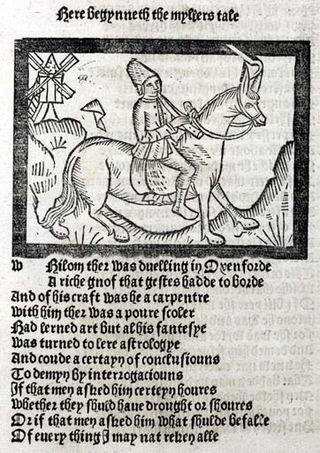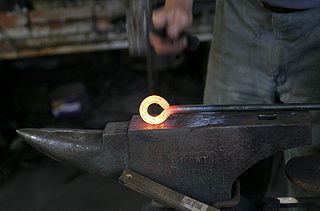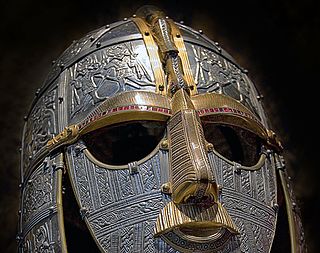Old English, or Anglo-Saxon, was the earliest recorded form of the English language, spoken in England and southern and eastern Scotland in the early Middle Ages. It developed from the languages brought to Great Britain by Anglo-Saxon settlers in the mid-5th century, and the first Old English literary works date from the mid-7th century. After the Norman Conquest of 1066, English was replaced for several centuries by Anglo-Norman as the language of the upper classes. This is regarded as marking the end of the Old English era, since during the subsequent period the English language was heavily influenced by Anglo-Norman, developing into what is now known as Middle English in England and Early Scots in Scotland.

The Anglo-Saxons, in some contexts simply called Saxons or the English, were a cultural group who spoke Old English and inhabited much of what is now England and south-eastern Scotland in the Early Middle Ages. They traced their origins to Germanic settlers who became one of the most important cultural groups in Britain by the 5th century. The Anglo-Saxon period in Britain is considered to have started by about 450 and ended in 1066, with the Norman Conquest. Although the details of their early settlement and political development are not clear, by the 8th century a single Anglo-Saxon cultural identity which was generally called Englisc had developed out of the interaction of these settlers with the pre-existing Romano-British culture. By 1066, most of the people of what is now England spoke Old English, and were considered English. Viking and Norman invasions changed the politics and culture of England significantly, but the overarching Anglo-Saxon identity evolved and remained dominant even after the Norman Conquest. Late Anglo-Saxon political structures and language are the direct predecessors of the high medieval Kingdom of England and the Middle English language. Although the modern English language owes less than 26% of its words to Old English, this includes the vast majority of everyday words.

Middle English is a form of the English language that was spoken after the Norman Conquest of 1066, until the late 15th century. The English language underwent distinct variations and developments following the Old English period. Scholarly opinion varies, but the University of Valencia states the period when Middle English was spoken as being from 1150 to 1500. This stage of the development of the English language roughly followed the High to the Late Middle Ages.
English is a West Germanic language that originated from Ingvaeonic languages brought to Britain in the mid-5th to 7th centuries AD by Anglo-Saxon migrants from what is now northwest Germany, southern Denmark and the Netherlands. The Anglo-Saxons settled in the British Isles from the mid-5th century and came to dominate the bulk of southern Great Britain. Their language originated as a group of Ingvaeonic languages which were spoken by the settlers in England and southern and eastern Scotland in the early Middle Ages, displacing the Celtic languages, and, possibly, British Latin, that had previously been dominant. Old English reflected the varied origins of the Anglo-Saxon kingdoms established in different parts of Britain. The Late West Saxon dialect eventually became dominant. A significant subsequent influence upon the shaping of Old English came from contact with the North Germanic languages spoken by the Scandinavian Vikings who conquered and colonized parts of Britain during the 8th and 9th centuries, which led to much lexical borrowing and grammatical simplification. The Anglian dialects had a greater influence on Middle English.

West Country English is a group of English language varieties and accents used by much of the native population of the West Country, an area found in the southwest of England.
In an English-speaking country, Standard English (SE) is the variety of English that has undergone codification to the point of being socially perceived as the standard language, associated with formal schooling, language assessment, and official print publications, such as public service announcements and newspapers of record, etc. All linguistic features are subject to the effects of standardisation, including morphology, phonology, syntax, lexicon, register, discourse markers, pragmatics, as well as written features such as spelling conventions, punctuation, capitalisation and abbreviation practices. SE is local to nowhere: its grammatical and lexical components are no longer regionally marked, although many of them originated in different, non-adjacent dialects, and it has very little of the variation found in spoken or earlier written varieties of English. According to Peter Trudgill, Standard English is a social dialect pre-eminently used in writing that is distinguishable from other English dialects largely by a small group of grammatical "idiosyncrasies", such as irregular reflexive pronouns and an "unusual" present-tense verb morphology.

Smith is an occupational surname originating in England. It is the most prevalent surname in the United Kingdom, the United States, Australia, Canada, and New Zealand, and the fifth most common surname in the Republic of Ireland. In the United States, the surname Smith is particularly prevalent among those of English, Scottish, and Irish descent, but is also a common surname among African-Americans, which can be attributed either to African slaves having been given the surname of their masters, or to being an occupational name, as some southern African-Americans took this surname to reflect their or their father's trade. 2,442,977 Americans shared the surname Smith at the time of the 2010 census, and more than 500,000 people shared it in the United Kingdom as of 2006. At the turn of the 20th century, the surname was sufficiently prevalent in England to have prompted the statement: "Common to every village in England, north, south, east, and west"; and sufficiently common on the (European) continent to be "common in most countries of Europe".

Sub-Roman Britain is the period of late antiquity in Great Britain between the end of Roman rule and the Anglo-Saxon settlement. The term was originally used to describe archaeological remains found in 5th- and 6th-century AD sites that hinted at the decay of locally made wares from a previous higher standard under the Roman Empire. It is now used to describe the period that commenced with the recall of Roman troops to Gaul by Constantine III in 407 and to have concluded with the Battle of Deorham in 577.

The Britons, also known as Celtic Britons or Ancient Britons, were the indigenous Celtic people who inhabited Great Britain from at least the British Iron Age until the High Middle Ages, at which point they diverged into the Welsh, Cornish, and Bretons. They spoke Common Brittonic, the ancestor of the modern Brittonic languages.
Borgman or Borgmann is an Anglo-Saxon and Frisian surname of Dutch, English, German (Germanic) name. It used to be the name given for landlords who worked for kings, royal aristocracy in the Middle Ages. They collected payments, therefore the Dutch name 'borg', to take toll/to take money, and 'man', the person who takes it. In this case this was the landlord. Parts includes Lower Saxony, Groningen, Gelderland, Overijssel, Drenthe, Friesland, Frisia and East Frisia and England.

The Tribal Hidage is a list of thirty-five tribes that was compiled in Anglo-Saxon England some time between the 7th and 9th centuries. It includes a number of independent kingdoms and other smaller territories, and assigns a number of hides to each one. The list is headed by Mercia and consists almost exclusively of peoples who lived south of the Humber estuary and territories that surrounded the Mercian kingdom, some of which have never been satisfactorily identified by scholars. The value of 100,000 hides for Wessex is by far the largest: it has been suggested that this was a deliberate exaggeration.
Butt is a German and an English surname whose origins lie in the South West peninsula region of England.

Anglo-Norman, also known as Anglo-Norman French, was a dialect of Old Norman that was used in England and, to a lesser extent, other places in Great Britain and Ireland during the Anglo-Norman period.
Germanic given names are traditionally dithematic; that is, they are formed from two elements, by joining a prefix and a suffix. For example, King Æþelred's name was derived from æþele, meaning "noble", and ræd, meaning "counsel".
Brunskill is a rare Viking ornamental surname derived from Old English and Old Norse. It is thought to have originated during the early Middle Ages in Scandinavian York and based on the River Skell.

The settlement of Great Britain by diverse Germanic peoples led to the development of a new Anglo-Saxon cultural identity and shared Germanic language, Old English, which was most closely related to Old Frisian on the other side of the North Sea. The first Germanic speakers to settle permanently are likely to have been soldiers recruited by the Roman administration, possibly already in the fourth century or earlier. In the early fifth century, after the end of Roman rule in Britain and the breakdown of the Roman economy, larger numbers arrived and their impact upon local culture and politics increased.
Cruise is an Anglo-Norman surname which originated in England during Norman Conquest. It is a variant form of Cruce, Cruys, Cruse; others include Cruwys (Welsh) and Cruize. The surname Cruise was found in Bedfordshire, located in Southeast-central England, formerly part of the Anglo-Saxon kingdom of Mercia.

Waering is a Germanic surname. Although Grant Allen and Isaac Taylor described Wæring as an Anglo-Saxon clan name equivalent to the Norse Væringjar, the eminent British philologist Walter William Skeat suggested that it might be a patronymic.
![]() United Kingdom is a relatively rare surname.
United Kingdom is a relatively rare surname.








